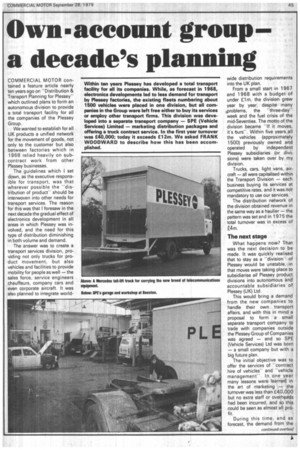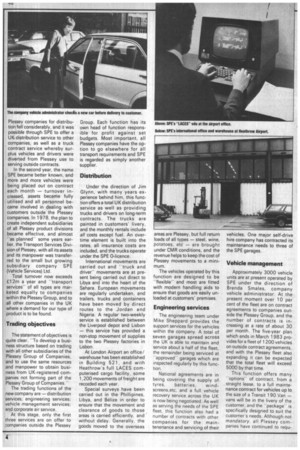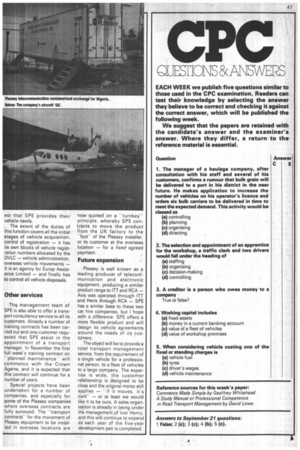Own-account group a decade's planning
Page 47

Page 48

Page 49

If you've noticed an error in this article please click here to report it so we can fix it.
COMMERCIAL MOTOR contained a feature article nearly ten years ago on "Distribution & Transport Planning for Plessey" which outlined plans to form an autonomous division to provide a total transport facility for all the companies of the Plessey Group.
We wanted to establish for all UK products a unified network for the movement of goods, not only to the customer but also between factories which in 1968 relied heavily on subcontract work from other Plessey businesses.
The guidelines which I set down, as the executive responsible for transport, was that wherever possible the "distribution of product" should be interwoven into other needs for transport services. The reason for this was that I foresaw in the next decade the gradual effect of electronics development in all areas in which Plessey was involved, and the need for this type of distribution diminishing in both volume and demand.
The answer was to create a transport services division, providing not only trucks for product movement, but also vehicles and facilities to provide mobility for people as well — the sales force, service engineers chauffeurs, company cars and even corporate aircraft. It was also planned to integrate world wide distribution requirements into the UK plan.
From a small start in 1967 and 1968 with a budget of under £1 m, the division grew year by year, despite many .problems, the "three-day" week and the fuel crisis of the mid-Seventies. The motto of the division became "If it moves, it's Ours". Within five years all the vehicles (approximately 1500) previously owned and operated by independent Plessey subsidiaries (or divisions) were taken over by my division.
Trucks, cars, light vans, aircraft — all were capitalised within the Transport Division — each business buying its services at competitive rates, and it was not mandatory to use our services.
The distribution network of the division obtained revenue in the same way as a haulier — the pattern was set and in 1975 the total turnover was in excess of t4m.
The next stage
What happens now? That was the next decision to be made. It was quickly realised that to stay as a "division" of Plessey would be unstable, in that moves were taking place to subsidiarise all Plessey product divisions into autonomous and accountable subsidiaries of Plessey (UK) Ltd.
This would bring a demand from the new companies to handle their own transport affairs, and with this in mind a proposal to form a small separate transport company to trade with companies outside the Plessey Group of Companies was agreed — and so SPE (Vehicle Services) Ltd was born — a small company but with a big future plan.
The initial objective was to offer the services of "contract hire of vehicles" and "vehicle management". In one year many lessons were learned in the art of marketing — the turnover was less than £40,000 but no extra staff or overheads had been incurred, and so this could be seen as almost all profit.
During this time, and as forecast, the demand from the Plessey companies for distribution fell considerably, and it was possible through SPE to offer a UK distribution service to other companies, as well as a truck contract service whereby surplus vehicles and drivers were diverted from Plessey use to serving outside contracts.
In the second year, the name SPE became better known, and more and more vehicles were being placed out on contract each month — turnover increased, assets became fully utilised and all personnel became involved in dealing with customers outside the Plessey companies. In 1978, the plan to create independent subsidiaries of all Plessey product divisions became effective, and almost as plannedsome years earher, the Transport Services Division of Plessey, with all its assets and its manpower was transferred to the small but growing subsidiary company SPE (Vehicle Services) Ltd.
Total turnover now exceeds £12m a year and "transport services" of all types are marketed equally to companies within the Plessey Group, and to all other companies in the UK where a demand for our type of product is to be found.
Trading objectives
The statement of objectives is quite clear. "To develop a business structure based on trading with all other subsidiaries of the Plessey Group of Companies, and to use the same resources and manpower to obtain business from UK-registered companies not forming part of the Plessey Group of Companies.'
The trading functions of the new company are — distribution services; engineering services; vehicle management services: and corporate air service.
At this stage, only the first three services are on offer to companies outside the Plessey Group. Each function has its own head of function responsible for profit against set budgets. Most important, all Plessey companies have the option to go elsewhere for all transport requirements and SPE is regarded as simply another supplier.
Distribution Under the direction of Jim Glynn, with many years experience behind him, this function offers a total UK distribution service as well as providing trucks and drivers on long-term contracts. The trucks are painted in customers' livery, and the monthly rentals include all costs except fuel. An overtime element is built into the rates, all insurance costs are included, and the trucks operate under the SPE 0-licence.
International movements are carried out and "truck and drivermovements are at present being carried out direct to Libya and into the heart of the Sahara. European movements are regularly undertaken, and trailers, trucks and containers have been moved by direct routes to the Jordan and Nigeria. A regular two-weekly service is established between the Liverpool depot and Lisbon — this service has provided a non-stop movement of supplies to the two Plessey factories in Lisbon.
At London Airport an office/ warehouse has been established in Building 521, and with Heathrow's full LACES computerised cargo facility, some 1,200 movements of freight are recorded each year.
Special surveys have been carried out in the Phillipines. Libya, and Belize in order to ensure that the movement and clearance of goods to those areas is carried efficiently, and without delay. Generally, the goods moved to the overseas areas are Plessey, but full return loads of all types — steel, wine, potatoes, etc — are brought under CMR conditions, and the revenue helps to keep the cost of Plessey movements to a minimum.
The vehicles operated by this function are designed to be "flexible" and most are fitted with modern handling aids to ensure that goods are easily unloaded at customers' premises.
Engineering services The engineering team under Mike Sheppard provides the support services for the vehicles within the company. A total of seven garages spread across the UK is able to maintain and service about a half of the fleet, the remainder being serviced at -approved" garages which are inspected regularly by this function.
National agreements are in being covering the supply of.
tyres, batteries, windscreens,etc, and a full vehicle recovery service across the UK is now being negotiated. As well as serving the needs of the SPE fleet, this function also had a number of contracts with other companies for the maintenenance and servicing of their
vehicles. One major self-drive hire company has contracted its maintenance needs to three of the SPE garages.
Vehicle management
Approximately 3000 vehicle units are at present operated by SPE under the direction of Brenda Smales, company vehicle administrator. At the present moment over 10 per cent of the fleet are on contract agreements to companies outside the Plessey Group, and the number of contracts is increasing at a rate of about 30 per month. The five-year plan which ends in March 1983 provides for a fleet of 1200 vehicles on outside contract agreements, and with the Plessey fleet also expanding it can be expected that the total fleet will exceed 5000 by that time.
This function offers many -optionsof contract, from a straight lease, to a full maintenance contract for vehicles up to the size of a Transit 190 Van — vans will be in the livery of the customer, and the -package" is specifically designed to suit the customer's needs. Although not mandatory. all Plessey companies have continued to requ
est that SPE provides their vehicle needs.
The extent of the duties of this function covers all the initial stages of vehicle acquisition, control of registration — it has its own blocks of vehicle registration numbers allocated by the DVLC — vehicle administration, overseas vehicle movements — it is an agency for Europ Assistance Limited — and finally has to control all vehicle disposals.
Other services ThQ management team of SPE is also able to offer a transport consultancy service to all its customers. Already a number of training contracts has been carried out and one customer requested that SPE assist in the appointment of a transport manager. In November the first full week's training contract on "planned maintenancewill commence with the Crown Agents, and it is expected that this contract will continue for a number of years.
Special projects have been undertaken for a number of companies. and especially for some of the Plessey companies where overseas contracts are fully surveyed. The "transport contracts" for the movement of
Plessey equipment to be installed in overseas locations are now quoted on a 'turnkey principle, whereby SPE contracts to move the product from the UK factory to the -foot" of the Plessey installer, or its customer at the overseas location — for a fixed agreed payment.
Future expansion
Plessey is well known as a leading producer of telecommunication and electronic equipment, producing a similar product range to ITT and RCA — Avis was operated through ITT and Hertz through RCA — SPE has a similar base to these two car hire companies, but I hope with a difference SPE offers a more flexible product and will design its vehicle agreements around the needs of its customers.
The object will be to provide a total transport management service, from the requirement of a single vehicle for a professional person, to a fleet of vehicles to a large company. The expertise is wide, the customer relationship is designed to be close and the original motto still applies — "if it moves, it's ours" — or at least we would like it to be ours. A sales organisation is already in being under the management of Ivor Henry, and this will continue to expand as each year of the five-year development pan is completed.




























































































































































